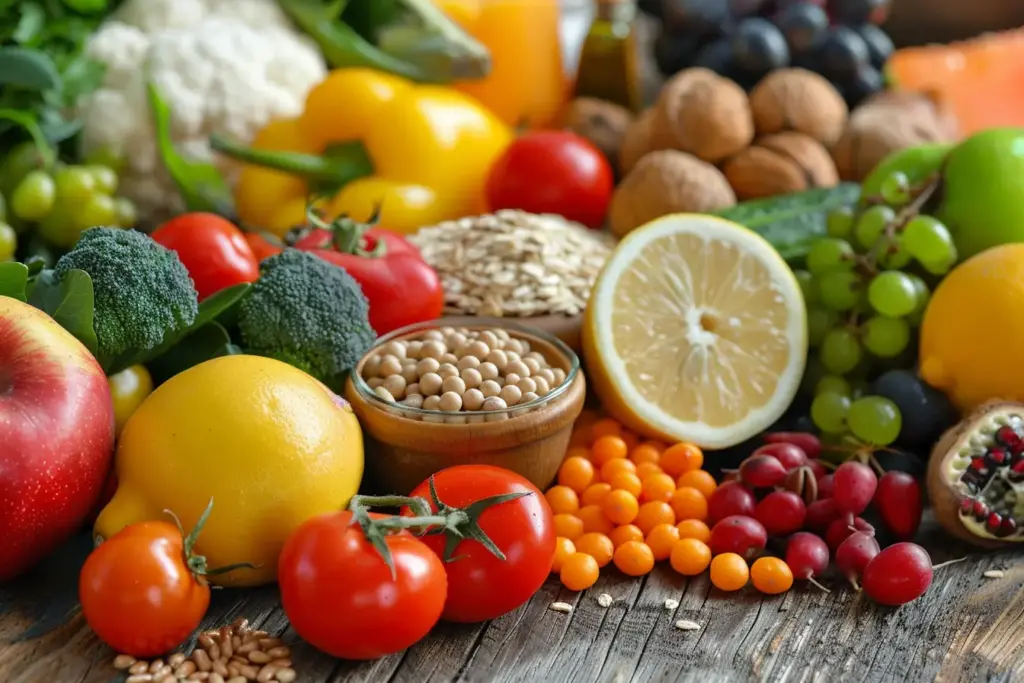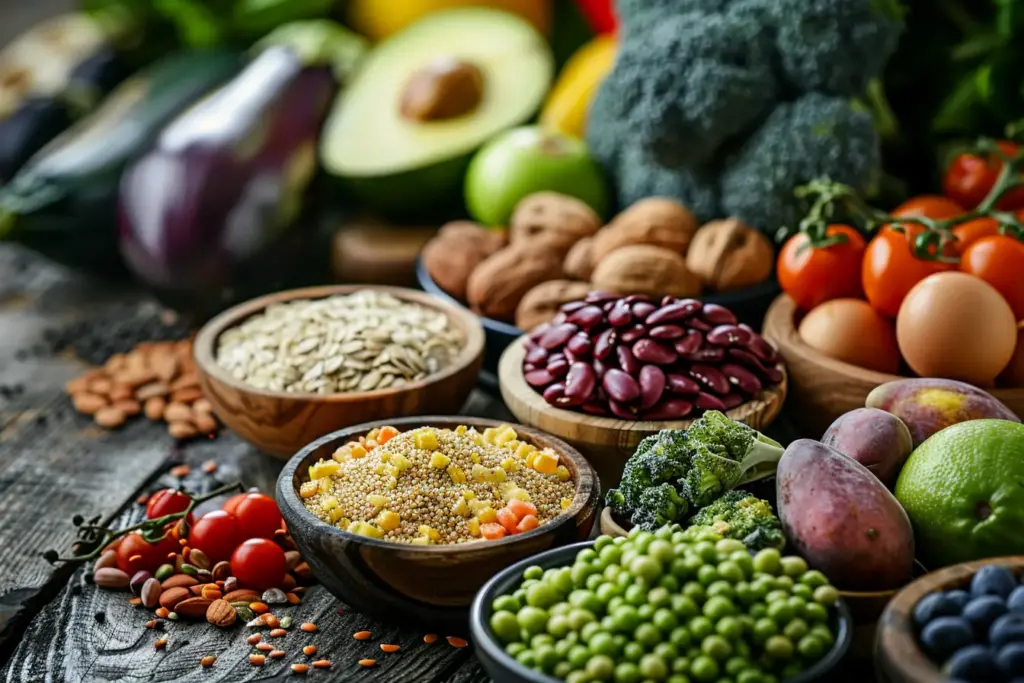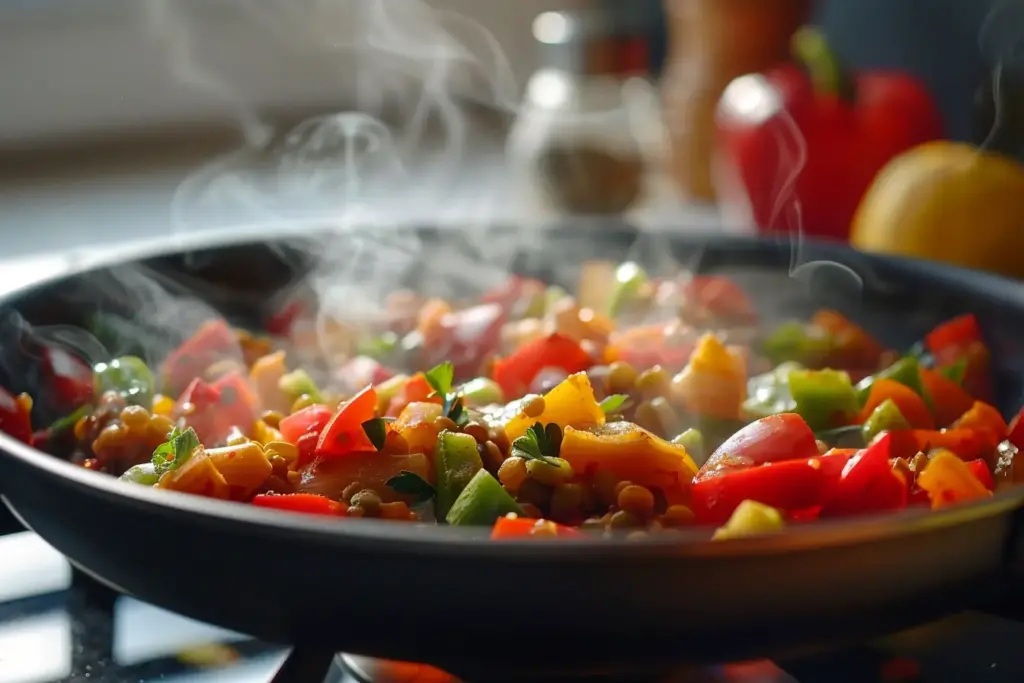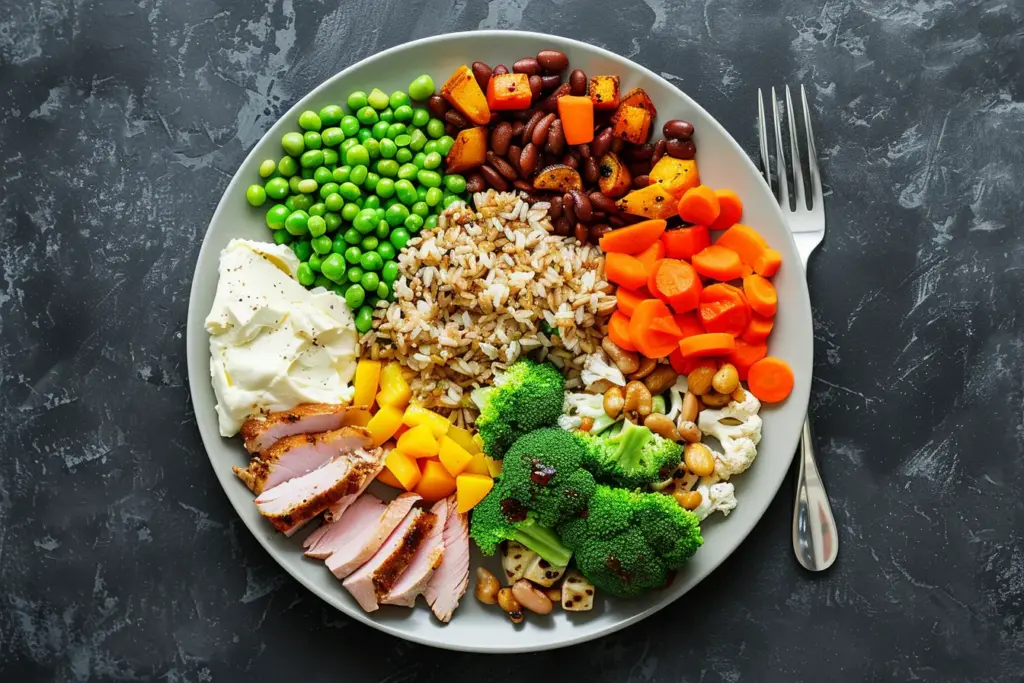Understanding the Basics of Going Vegan for Health
What is a Vegan Diet?
A vegan diet excludes all animal products, including meat, dairy, eggs, and honey. Instead, it focuses on plant-based foods such as fruits, vegetables, grains, nuts, seeds, and legumes. People choose veganism for various reasons, including ethical concerns, environmental impact, and health benefits. In this article, we focus on the health aspects of going vegan.
The Rise of Veganism for Health
In recent years, there has been a significant increase in people adopting a vegan diet for health reasons. Research shows that a well-planned vegan diet can provide all the nutrients your body needs and offer several health benefits, including improved heart health, weight management, and lower risk of certain diseases.
The Core Principles of Going Vegan for Health
When you decide to go vegan for health, it’s important to understand the core principles of a balanced vegan diet. These principles include:
- Variety: Eating a variety of foods ensures you get all the necessary nutrients.
- Whole Foods: Focusing on whole, unprocessed foods to maximize nutrient intake.
- Balanced Nutrition: Ensuring your diet includes adequate protein, carbohydrates, fats, vitamins, and minerals.
Initial Steps to Transition
Transitioning to a vegan diet can be smooth if done gradually. Here are some initial steps to consider:
- Start Slowly: Incorporate more plant-based meals into your diet. Replace meat and dairy with plant-based alternatives.
- Educate Yourself: Learn about the nutritional aspects of a vegan diet. Understanding where to get essential nutrients will help you maintain a balanced diet.
- Plan Your Meals: Meal planning can help ensure you get various nutrients. Look for simple and nutritious vegan recipes to get started.
The Importance of Whole Foods
A key aspect of going vegan for health is focusing on whole foods. Whole foods are minimally processed and rich in nutrients, making them an excellent choice for maintaining good health. Examples include fresh fruits, vegetables, whole grains, nuts, seeds, and legumes. These foods are not only nutrient-dense but also help in reducing the intake of unhealthy fats and sugars.
Understanding the Health Benefits
Going vegan for health means embracing a diet that can lead to numerous health benefits. Research indicates that a well-balanced vegan diet can help:
- Reduce the Risk of Chronic Diseases: Lower rates of heart disease, hypertension, and type 2 diabetes.
- Aid in Weight Management: Vegan diets are often lower in calories and fat, helping maintain a healthy weight.
- Improve Digestive Health: High fiber content in plant-based foods promotes healthy digestion.

The Health Benefits of a Vegan Diet
Improved Heart Health
One of the significant health benefits of going vegan is the potential improvement in heart health. A vegan diet is typically lower in saturated fats and cholesterol, commonly found in animal products. Instead, plant-based foods are rich in fiber, antioxidants, and healthy fats, all contributing to cardiovascular health. Studies have shown that vegans have lower blood pressure, reduced LDL cholesterol levels, and a lower risk of heart disease.
Weight Management and Loss
Adopting a vegan diet can be an effective way to manage and lose weight. Plant-based diets are often lower in calories and higher in fiber, which can help you feel full longer and reduce overall calorie intake. Research has indicated that individuals who follow a vegan diet tend to have a lower body mass index (BMI) compared to those who consume animal products. Focusing on nutrient-dense plant foods allows you to achieve and maintain a healthy weight more quickly.
Reduced Risk of Chronic Diseases
Going vegan for health can significantly reduce the risk of developing chronic diseases. For example, a diet rich in fruits, vegetables, whole grains, and legumes has been associated with a lower risk of type 2 diabetes. The high fiber content in plant-based foods helps regulate blood sugar levels and improve insulin sensitivity. Additionally, the anti-inflammatory properties of many plant foods can contribute to reduced risks of certain cancers and other inflammatory conditions.
Better Digestive Health
A vegan diet is inherently high in dietary fiber, which is crucial for maintaining good digestive health. Fiber aids in regular bowel movements prevents constipation and promotes a healthy gut microbiome. Consuming various fiber-rich foods such as fruits, vegetables, legumes, and whole grains can help prevent digestive issues like irritable bowel syndrome (IBS) and diverticulitis. Improved digestion also means better nutrient absorption and overall health.
Enhanced Energy Levels
Many people report feeling more energetic after switching to a vegan diet. This increase in energy can be attributed to several factors, including better digestion, stabilized blood sugar levels, and the high nutrient density of plant-based foods. By avoiding heavy, processed, and fatty animal products, your body can operate more efficiently, sustaining energy throughout the day.
Improved Skin Health
The health benefits of going vegan extend to improved skin health. Plant-based diets are rich in vitamins, minerals, and antioxidants that can contribute to clearer and more radiant skin. For instance, vitamin C, found in many fruits and vegetables, helps in collagen production, which keeps the skin firm and youthful. Additionally, reducing the intake of dairy and processed foods can help decrease the occurrence of acne and other skin issues.
Enhanced Mental Clarity and Mood
Nutrition plays a crucial role in mental health, and a vegan diet can positively affect mood and mental clarity. Foods rich in antioxidants, healthy fats, and complex carbohydrates support brain function and can reduce symptoms of depression and anxiety. Omega-3 fatty acids in flaxseeds, chia seeds, and walnuts are particularly beneficial for cognitive health. By nourishing your body with plant-based foods, you can experience enhanced mental well-being.
Lowered Inflammation Levels
Chronic inflammation is linked to numerous health issues, including arthritis, cardiovascular diseases, and autoimmune disorders. A vegan diet with anti-inflammatory foods such as leafy greens, berries, nuts, and seeds can help reduce inflammation. These foods contain antioxidants and phytonutrients that combat oxidative stress and promote overall health. Reducing inflammation can lead to fewer aches and pains, improved mobility, and a lower risk of chronic diseases.

Essential Nutrients and How to Get Them on a Vegan Diet
Protein
Protein is crucial for muscle repair, immune function, and overall health. When going vegan for health, it’s important to include a variety of protein-rich plant foods to meet your daily needs. Excellent sources of vegan protein include:
- Legumes: Lentils, chickpeas, black beans, and soybeans
- Nuts and Seeds: Almonds, sunflower seeds, chia seeds, and hemp seeds
- Whole Grains: Quinoa, farro, and brown rice
- Vegetables: Broccoli, spinach, and Brussels sprouts
Iron
Iron is essential for transporting oxygen in the blood and maintaining energy levels. While plant-based iron (non-heme iron) is not absorbed as efficiently as animal-based iron (heme iron), you can enhance absorption by consuming vitamin C-rich foods alongside iron-rich foods. Key vegan sources of iron include:
- Legumes: Lentils, chickpeas, and black beans
- Dark Leafy Greens: Spinach, kale, and Swiss chard
- Seeds: Pumpkin seeds, sesame seeds, and hemp seeds
- Fortified Foods: Cereals, bread, and plant-based milks
Calcium
Calcium is vital for bone health and muscle function. Vegans can obtain sufficient calcium through plant-based sources and fortified foods. Important sources of vegan calcium include:
- Leafy Greens: Collard greens, bok choy, and turnip greens
- Fortified Plant Milks: Almond milk, soy milk, and oat milk
- Tofu: Especially calcium-set tofu
- Seeds and Nuts: Almonds, chia seeds, and tahini
Vitamin B12
Vitamin B12 is crucial for nerve function and the production of DNA and red blood cells. Since B12 is naturally found in animal products, vegans must rely on fortified foods or supplements to meet their requirements. Sources of vitamin B12 for vegans include:
- Fortified Foods: Nutritional yeast, breakfast cereals, and plant-based milks
- Supplements: Vitamin B12 supplements in pill or liquid form
Omega-3 Fatty Acids
Omega-3 fatty acids are important for heart health, brain function, and reducing inflammation. While fish is a common source of omega-3s, vegans can obtain these essential fats from plant-based sources. Vegan sources of omega-3s include:
- Seeds: Flaxseeds, chia seeds, and hemp seeds
- Nuts: Walnuts
- Algae Oil: A direct source of DHA and EPA, similar to fish oil
Zinc
Zinc supports immune function, wound healing, and DNA synthesis. A vegan diet should include Plant-based zinc sources to ensure adequate intake. Key vegan sources of zinc include:
- Legumes: Lentils, chickpeas, and black beans
- Nuts and Seeds: Pumpkin seeds, cashews, and hemp seeds
- Whole Grains: Quinoa, oats, and brown rice
- Fortified Foods: Cereals and bread
Iodine
Iodine is essential for thyroid function and metabolic regulation. While iodine is commonly found in seafood, vegans can obtain it through other sources. Important sources of iodine for vegans include:
- Iodized Salt: Regular table salt fortified with iodine
- Sea Vegetables: Seaweed such as nori, kelp, and dulse
- Supplements: Iodine supplements if necessary
Vitamin D
Vitamin D is crucial for bone health, immune function, and mood regulation. While sunlight exposure is a primary source of vitamin D, dietary sources are also important. Vegan sources of vitamin D include:
- Fortified Foods: Plant-based milks, orange juice, and cereals
- Mushrooms: Especially those exposed to sunlight
- Supplements: Vitamin D2 or vegan vitamin D3 supplements
By including a variety of these nutrient-rich foods, those going vegan for health can ensure they meet their nutritional needs and maintain optimal health.

Tips for Transitioning to a Vegan Lifestyle
Start with Small Changes
When going vegan for health reasons, it’s often best to start with small, manageable changes rather than overhauling your entire diet overnight. Begin by incorporating more plant-based meals into your diet. Try replacing one meal daily with a vegan option and gradually increasing the number of vegan meals as you become more comfortable with the new foods and recipes.
Educate Yourself
Knowledge is critical when transitioning to a vegan lifestyle. Take time to learn about the nutritional aspects of a vegan diet to ensure you’re meeting all your dietary needs. Familiarize yourself with plant-based sources of essential nutrients and how to create balanced meals. Reading books, following reputable vegan blogs, and consulting a registered dietitian can provide valuable insights and guidance.
Plan Your Meals
Meal planning is crucial for health when going vegan. By planning your meals in advance, you can ensure you get various nutrients and avoid unhealthy convenience foods. Start by selecting a few simple recipes you enjoy and gradually expand your repertoire. Use a weekly meal planner to organize your meals and create a shopping list to make grocery shopping more efficient.
Explore New Foods and Flavors
One of the exciting aspects of transitioning to a vegan lifestyle is discovering new foods and flavors. Experiment with different plant-based ingredients, spices, and cooking methods to keep your meals exciting and satisfying. Try incorporating foods from various cuisines to add diversity to your diet and prevent monotony.
Find Vegan Alternatives
Look for vegan alternatives to your favorite non-vegan foods to make the transition smoother. Many plant-based meat, dairy, and egg substitutes, including vegan burgers, plant-based milks, and egg replacers, are available. These alternatives can ease the transition by allowing you to enjoy familiar flavors and textures while sticking to a vegan diet.
Connect with the Vegan Community
Connecting with other vegans can provide support, motivation, and inspiration during your transition. Join local or online vegan groups, attend vegan meetups, and follow vegan influencers on social media. Being part of a community can help you stay informed about new products, recipes, and events and provide a sense of camaraderie.
Prepare for Social Situations
Navigating social situations can be challenging when you’re new to a vegan lifestyle. Communicate your dietary preferences to friends and family in advance and offer to bring a vegan dish to gatherings. When dining out, research vegan-friendly restaurants or look at menus ahead of time to find suitable options. Many restaurants are accommodating and can modify dishes to meet your needs.
Stay Patient and Persistent
Transitioning to a vegan lifestyle is a journey; staying patient and persistent is important. There may be challenges and setbacks, but don’t get discouraged. Focus on your reasons for going vegan for health and remind yourself of the benefits. Celebrate your progress and explore new foods and recipes to keep your diet enjoyable and sustainable.

Common Challenges and How to Overcome Them
Finding Suitable Food Options
One common challenge when going vegan for health is finding suitable food options, especially when dining out or traveling. To overcome this, research vegan-friendly restaurants in your area and familiarize yourself with their menus. Many restaurants now offer vegan options or can customize dishes to meet your needs. When traveling, pack snacks like nuts, dried fruits, and energy bars to ensure you have access to nutritious foods on the go.
Dealing with Social Pressures
Social pressures can be a significant challenge for new vegans. Friends and family may question your dietary choices or offer non-vegan foods. To handle this:
- Communicate your reasons for going vegan for health clearly and confidently.
- Educate those around you about the benefits of a vegan diet and offer to share delicious vegan recipes with them.
- Surround yourself with supportive individuals and seek out vegan communities for encouragement.
Managing Nutrient Deficiencies
Ensuring adequate nutrient intake is crucial when transitioning to a vegan diet. Some nutrients, such as vitamin B12, iron, and omega-3 fatty acids, may require special attention. To overcome this challenge, plan your meals carefully to include a variety of nutrient-dense foods. Consider using fortified foods and supplements as needed to meet your nutritional requirements. Consulting with a registered dietitian can provide personalized guidance and help prevent deficiencies.
Handling Cravings for Non-Vegan Foods
Cravings for non-vegan foods can be a common obstacle, especially in the early transition stages. To manage cravings, find satisfying vegan alternatives that mimic the flavors and textures of your favorite non-vegan foods. For example, try plant-based burgers, dairy-free cheeses, and egg substitutes. Experiment with spices and seasonings to enhance your meals’ taste and satisfy your palate.
Reading Food Labels
Navigating food labels can be challenging when going vegan for health. Many processed foods contain hidden animal-derived ingredients. To address this, become familiar with common non-vegan ingredients such as gelatin, casein, and whey. Look for vegan certification labels and choose whole, unprocessed foods whenever possible. Using vegan apps and resources can help you identify vegan-friendly products more efficiently.
Ensuring Balanced Meals
Creating balanced meals is essential for maintaining health on a vegan diet. It can be challenging to ensure you get all the necessary nutrients, especially if you’re new to veganism. To overcome this, use the plate method to structure your meals: fill half your plate with vegetables and fruits, a quarter with whole grains, and the remaining quarter with protein sources like legumes, tofu, or tempeh. Incorporate healthy fats from nuts, seeds, and avocados.
Staying Motivated
Staying motivated can be difficult, especially when faced with challenges and setbacks. To maintain motivation:
- Keep reminding yourself of the reasons you chose to go vegan for health.
- Track your progress and celebrate small victories along the way.
- Connect with other vegans for support and inspiration.
- Keep learning about the benefits of a vegan lifestyle and continue exploring new foods and recipes to keep your diet exciting and enjoyable.
Coping with Limited Time for Meal Preparation
Finding time for meal preparation can be a challenge in a busy lifestyle. Consider meal prepping on weekends or during your free time to address this. Prepare large batches of grains, legumes, and vegetables that you can use throughout the week. Use simple and quick recipes that require minimal ingredients and cooking time. Invest in kitchen tools like a slow cooker or Instant Pot to make meal preparation more efficient.

Delicious and Nutritious Vegan Recipes to Try
Breakfast: Vegan Smoothie Bowl
Starting your day with a nutrient-packed vegan smoothie bowl can be delicious and energizing. Here’s a simple recipe to try:
Ingredients:
- 1 frozen banana
- 1 cup frozen berries (strawberries, blueberries, raspberries)
- 1 cup spinach
- 1 cup unsweetened almond milk
- 1 tablespoon chia seeds
- 1 tablespoon almond butter
Instructions:
- Blend all ingredients until smooth.
- Pour into a bowl and top with your favorite toppings, such as granola, sliced fruit, and coconut flakes.
Lunch: Chickpea Salad Sandwich
For a hearty and satisfying lunch, a chickpea salad sandwich is an excellent choice when going vegan for health.
Ingredients:
- 1 can chickpeas, drained and mashed
- 1/4 cup vegan mayonnaise
- 1 tablespoon Dijon mustard
- 1 celery stalk, finely chopped
- 1/4 cup red onion, finely chopped
- 1 tablespoon lemon juice
- Salt and pepper to taste
- Whole grain bread
- Lettuce and tomato slices
Instructions:
- In a bowl, combine mashed chickpeas, vegan mayonnaise, Dijon mustard, celery, red onion, lemon juice, salt, and pepper.
- Mix well and spread onto whole grain bread.
- Add lettuce and tomato slices, then assemble the sandwich.
Snack: Roasted Chickpeas
Roasted chickpeas make a perfect crunchy snack that is both nutritious and satisfying.
Ingredients:
- 1 can chickpeas, drained and rinsed
- 1 tablespoon olive oil
- 1 teaspoon smoked paprika
- 1/2 teaspoon garlic powder
- 1/2 teaspoon onion powder
- Salt to taste
Instructions:
- Preheat the oven to 400°F (200°C).
- Toss chickpeas with olive oil and spices.
- Spread chickpeas on a baking sheet and roast for 20-30 minutes, stirring occasionally, until crispy.
Dinner: Lentil and Vegetable Stir-Fry
A lentil and vegetable stir-fry is a flavorful and nutrient-dense dinner option when going vegan for health.
Ingredients:
- 1 cup cooked lentils
- 2 tablespoons olive oil
- 1 onion, sliced
- 2 garlic cloves, minced
- 1 bell pepper, sliced
- 1 zucchini, sliced
- 1 cup broccoli florets
- 3 tablespoons soy sauce
- 1 tablespoon rice vinegar
- 1 teaspoon sesame oil
- Cooked brown rice
Instructions:
- Heat olive oil in a large skillet over medium heat.
- Add onion and garlic, and sauté until translucent.
- Add bell pepper, zucchini, and broccoli, and cook until tender-crisp.
- Stir in cooked lentils, soy sauce, rice vinegar, and sesame oil. Cook for another 5 minutes.
- Serve over cooked brown rice.
Dessert: Chocolate Avocado Mousse
For a healthy yet indulgent dessert, try this creamy chocolate avocado mousse.
Ingredients:
- 2 ripe avocados
- 1/4 cup cocoa powder
- 1/4 cup maple syrup
- 1/4 cup almond milk
- 1 teaspoon vanilla extract
- Pinch of salt
Instructions:
- Blend all ingredients in a food processor until smooth and creamy.
- Chill in the refrigerator for at least 30 minutes before serving.
Smoothie: Green Power Smoothie
A green power smoothie is a great way to pack in nutrients and start your day with a boost of energy.
Ingredients:
- 1 cup kale leaves
- 1 banana
- 1/2 cup pineapple chunks
- 1/2 avocado
- 1 tablespoon chia seeds
- 1 cup coconut water
Instructions:
- Blend all ingredients until smooth.
- Serve immediately for a refreshing and nutritious drink.
Salad: Quinoa and Black Bean Salad
A quinoa and black bean salad is a versatile and protein-rich meal option.
Ingredients:
- 1 cup cooked quinoa
- 1 can black beans, drained and rinsed
- 1 red bell pepper, diced
- 1 cup corn kernels
- 1/4 cup red onion, finely chopped
- 1/4 cup cilantro, chopped
- 2 tablespoons olive oil
- 1 tablespoon lime juice
- Salt and pepper to taste
Instructions:
- In a large bowl, combine cooked quinoa, black beans, bell pepper, corn, red onion, and cilantro.
- Drizzle with olive oil and lime juice, then season with salt and pepper.
- Toss to combine and serve chilled or at room temperature.
Soup: Creamy Tomato Basil Soup
A creamy tomato basil soup is comforting and flavorful, perfect for any time of the year.
Ingredients:
- 2 tablespoons olive oil
- 1 onion, chopped
- 3 garlic cloves, minced
- 4 cups tomatoes, chopped
- 2 cups vegetable broth
- 1/2 cup coconut milk
- 1/4 cup fresh basil leaves
- Salt and pepper to taste
Instructions:
- Heat olive oil in a large pot over medium heat.
- Add onion and garlic, and sauté until soft.
- Add tomatoes and vegetable broth, and bring to a boil. Reduce heat and simmer for 20 minutes.
- Stir in coconut milk and fresh basil, then use an immersion blender to puree until smooth.
- Season with salt and pepper, and serve hot.

Real-Life Success Stories of Going Vegan for Health
Jane’s Journey to Lower Cholesterol
Jane, a 45-year-old marketing executive, decided to go vegan for health after her doctor warned her about high cholesterol levels. Jane significantly reduced her cholesterol levels within six months of adopting a plant-based diet. She embraced whole foods, such as fruits, vegetables, legumes, and whole grains, and eliminated processed foods and animal products. Jane reports feeling more energetic and healthier than ever before.
Mike’s Transformation for Weight Loss
Mike, a 32-year-old software developer, has struggled with weight issues for years. After trying various diets with limited success, Mike decided to go vegan for health reasons. By focusing on whole, plant-based foods, Mike lost 30 pounds in eight months. He incorporated regular exercise and found that his energy levels and overall well-being improved significantly. Mike’s story is a testament to the effectiveness of a vegan diet for weight management.
Sarah’s Battle with Type 2 Diabetes
Sarah, a 50-year-old teacher, was diagnosed with type 2 diabetes. Determined to improve her health, she chose to go vegan. Eliminating animal products and processed foods and increasing her intake of fiber-rich plant foods allowed Sarah to manage her blood sugar levels better. Her doctor was impressed with her progress, and Sarah continues to follow a vegan diet to maintain her health.
David’s Recovery from Hypertension
David, a 60-year-old retired engineer, suffered from hypertension for years. After researching dietary changes, David decided to go vegan for health. He focused on eating various fruits, vegetables, legumes, and whole grains, which helped him reduce his blood pressure naturally. David also included regular physical activity and meditation in his routine. His blood pressure is well-controlled today, and he feels more vibrant and active.
Emily’s Journey to Overcome Digestive Issues
Emily, a 28-year-old graphic designer, experienced chronic digestive issues for most of her adult life. Frustrated with conventional treatments, she decided to go vegan for health. Emily’s transition to a plant-based diet rich in fiber and whole foods helped alleviate her digestive problems. She found relief from bloating and discomfort and now enjoys a diverse and balanced vegan diet.
Tom’s Path to Better Athletic Performance
Tom, a 35-year-old amateur athlete, sought to improve his athletic performance. Inspired by professional athletes who had adopted plant-based diets, Tom decided to go vegan for health. He noticed improvements in his recovery time, stamina, and overall performance. Tom’s diet includes a variety of protein-rich plants, complex carbohydrates, and healthy fats, which fuel his rigorous training regimen.
Lisa’s Success in Managing PCOS
Lisa, a 29-year-old nurse, was diagnosed with polycystic ovary syndrome (PCOS) and struggled with symptoms such as weight gain and irregular menstrual cycles. After learning about the benefits of a vegan diet, Lisa decided to go vegan for health. Lisa lost weight and regulated her menstrual cycle by focusing on whole, plant-based foods and avoiding processed foods. Her symptoms have significantly improved, and she continues to thrive on a vegan diet.
Mark’s Victory Over Chronic Fatigue
Mark, a 40-year-old writer, has dealt with chronic fatigue for years, which has affected his productivity and quality of life. Desperate for a solution, Mark decided to go vegan for health. By adopting a nutrient-dense vegan diet rich in antioxidants and anti-inflammatory foods, Mark experienced a remarkable increase in his energy levels. He enjoys sustained energy throughout the day and attributes his recovery to his plant-based lifestyle.

Frequently Asked Questions about Going Vegan for Health
Is a Vegan Diet Healthy for Everyone?
Many people wonder if going vegan for health is suitable for everyone. A well-planned vegan diet can provide all the essential nutrients for a healthy lifestyle. However, it’s important to consider individual health needs and consult with a healthcare professional or a registered dietitian before making significant dietary changes.
How Do I Ensure I’m Getting Enough Protein?
Protein is a common concern for those new to veganism. You can meet your protein needs by including various plant-based sources, such as beans, lentils, tofu, tempeh, quinoa, nuts, and seeds. Combining different protein sources throughout the day can ensure you get all essential amino acids.
What Are the Best Sources of Vitamin B12 for Vegans?
Vitamin B12 is crucial for nerve function and red blood cell production. Since it’s not naturally found in plant foods, vegans should consume fortified foods like nutritional yeast, plant-based milks, and cereals or take a B12 supplement to meet their needs.
How Can I Avoid Nutrient Deficiencies?
When going vegan for health, plan your meals to ensure you’re getting a balanced diet. Focus on fruits, vegetables, whole grains, legumes, nuts, and seeds. Pay attention to essential nutrients like iron, calcium, omega-3 fatty acids, vitamin D, and zinc, and consider fortified foods or supplements if necessary.
Are There Vegan Alternatives to Common Animal Products?
Yes, there are many vegan alternatives available for common animal products. Plant-based versions of milk, cheese, yogurt, meat, and even eggs can be found. These alternatives can make transitioning to a vegan diet more manageable and enjoyable while ensuring you don’t miss out on your favorite foods.
Can I Eat Out at Restaurants as a Vegan?
Eating out as a vegan is becoming more accessible with the increasing availability of vegan options at restaurants. Many establishments now offer plant-based dishes or can modify existing menu items to be vegan. Researching restaurants beforehand, checking menus online, and communicating your dietary preferences with the staff can enhance your dining experience.
How Do I Deal with Cravings for Non-Vegan Foods?
Cravings are normal, especially when transitioning to a vegan diet. To manage cravings, find vegan alternatives that satisfy your taste buds. Experiment with new recipes, spices, and cooking techniques to make your meals flavorful and enjoyable. Over time, your cravings for non-vegan foods will likely diminish.
What Should I Do If I Make a Mistake and Eat Animal Products?
Don’t be too hard on yourself if you accidentally consume animal products. Mistakes can happen, especially when you’re new to veganism. Focus on your overall progress and continue striving to make plant-based choices. Use the experience as a learning opportunity and move forward with your commitment to going vegan for health.

